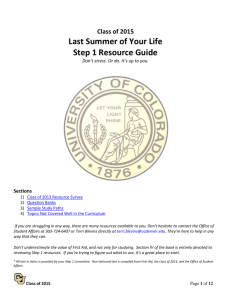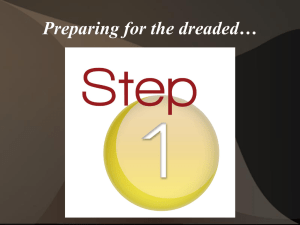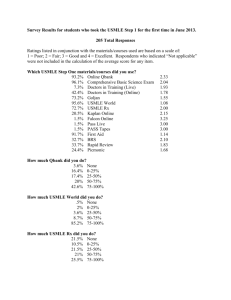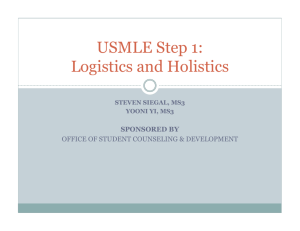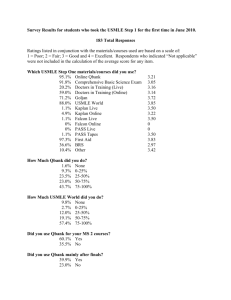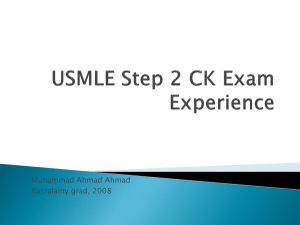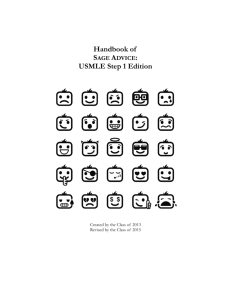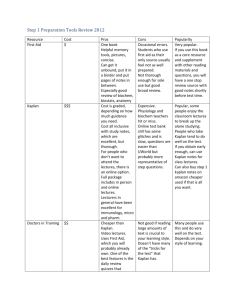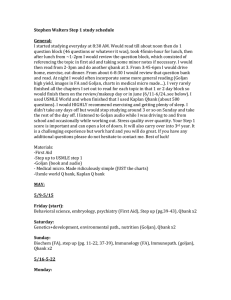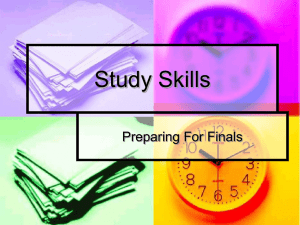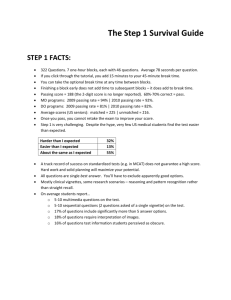Survey Results for students who took the USMLE Step 1 for the first
advertisement
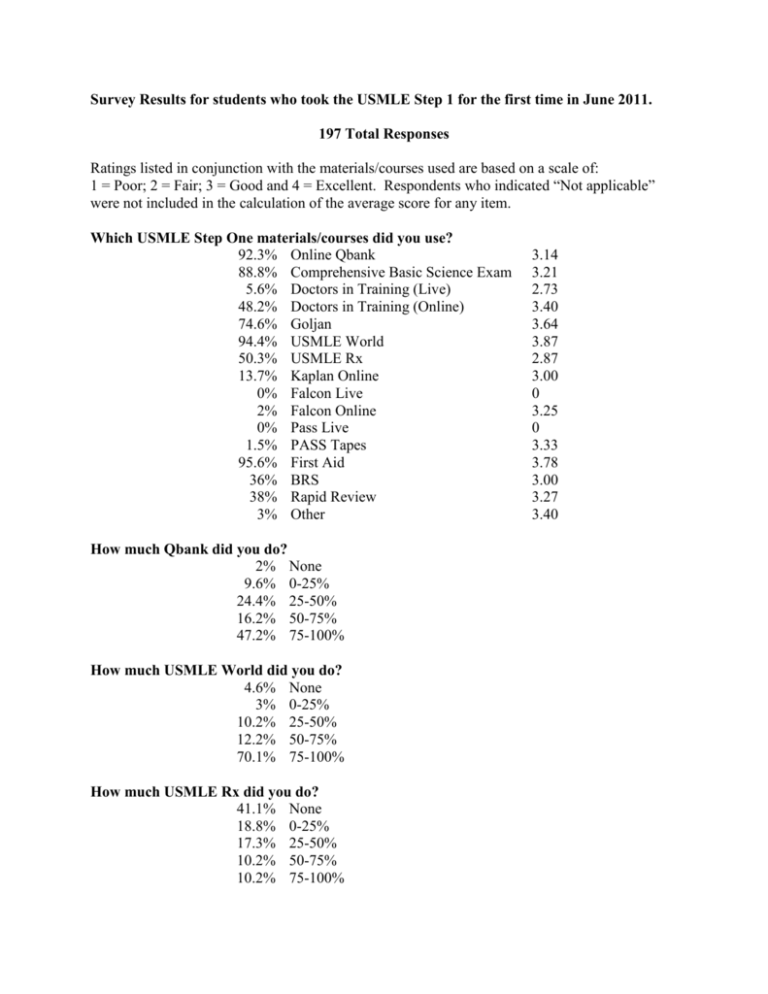
Survey Results for students who took the USMLE Step 1 for the first time in June 2011. 197 Total Responses Ratings listed in conjunction with the materials/courses used are based on a scale of: 1 = Poor; 2 = Fair; 3 = Good and 4 = Excellent. Respondents who indicated “Not applicable” were not included in the calculation of the average score for any item. Which USMLE Step One materials/courses did you use? 92.3% Online Qbank 88.8% Comprehensive Basic Science Exam 5.6% Doctors in Training (Live) 48.2% Doctors in Training (Online) 74.6% Goljan 94.4% USMLE World 50.3% USMLE Rx 13.7% Kaplan Online 0% Falcon Live 2% Falcon Online 0% Pass Live 1.5% PASS Tapes 95.6% First Aid 36% BRS 38% Rapid Review 3% Other How much Qbank did you do? 2% None 9.6% 0-25% 24.4% 25-50% 16.2% 50-75% 47.2% 75-100% How much USMLE World did you do? 4.6% None 3% 0-25% 10.2% 25-50% 12.2% 50-75% 70.1% 75-100% How much USMLE Rx did you do? 41.1% None 18.8% 0-25% 17.3% 25-50% 10.2% 50-75% 10.2% 75-100% 3.14 3.21 2.73 3.40 3.64 3.87 2.87 3.00 0 3.25 0 3.33 3.78 3.00 3.27 3.40 Did you use Qbank for your MS 2 courses? 59.4% Yes 40.6% No Did you use Qbank mainly after finals? 31.5% Yes 68.5% No When did you start serious review/study for Step One? 1.5% 1st Semester 42.1% January 30.5% Spring Break 21.3% After finals Did you take the practice exam at Prometrics? 6.6% Yes 93.4% No If you took the practice exam at Prometrics, did you find it useful? 14.7% Yes 85.3% No Testing Center Information Beaumont No comments recorded. Bedford No comments recorded. Bismarch, ND Clear Lake Coit Rd, Dallas Dallas, TX Doral, FL Diana Lane No comments recorded. El Paso No comments recorded. No comments recorded. No comments recorded. No comments recorded. No comments recorded. No comments recorded. Harwin Bass drum noise constantly, door opening & closing to room is loud & with everyone coming & going at different times it was distracting. Computer froze during section 6; information was recovered but lost a few minutes of exam time. Computers crashed during checking, causing a 40 min. delay Delayed login @ test center. Loud music outside, room too cold. I discovered that my headphones didn't work during my 15 min. tutorial session. They had to move me to a new computer. I got there at 7:15 and waited till 8:30 to take it. Everyone else had started except for me and another student. LOUD A/C!!! My computer froze in middle of the day, then had to wait for 30 min. for them to reboot. My start time was scheduled @ 2pm. I arrived @ 1:30 and was not able to start until 3pm. Our room experienced a glitch that caused all computers to freeze for an hour. No problems no problems - easy time friendly staff Occasionally heard a deep bass beat that lasted for 30 sec-1 min., but working that was too obnoxious. Problem w/ harwin- very loud A/C, bring your own ear buds. Several students (had their tests crash and took 1.5 hrs to fix. ) the proctors belittled us for being worried about the distraction and it was completely unprofessional for the amount of money we pay. The interfaced moved off the screen for a 2 or 3 minutes until moved to the next question. The server went down 10 minutes into the exam. There’s a car audio installation store nearby that tilts out the sobs throughout the day. I was pretty wind "in the zone", but towards the end when you get tired it can get distracting. They were very strict about not wearing a watch, not putting your hair up or putting on a sweater while in the test room, which was unexpected, wear pants without pockets. You can leave the test center, look at your notes, or do whatever you want on break Imperial Valley McAllen, TX Memphis NW Freeway San Antonio, TX Waco, TX Great, Quiet, peaceful The power went out during final section of my exam. The staff was very nonchalant about it saying that it happened all the time. At one point, the staff was telling everyone their exam would have to be rescheduled. I will most likely go to Diana Ln. Next The power went out during my exam on test day! No comments recorded. No comments recorded. No comments recorded. I had a GRE student next to me who was typing extremely aggressive & that interfered with my test. The test administrator would not allow me to move. No comments recorded. Comments on Qbank A little too detailed sometimes. Take with a grain of salt, but do take! explanations are over kill Gives you a good feel for the test but the questions are harder than the real thing Good for practice but questions on the real thing were a little different Good for studying but no like the real test. NBME online tests were more like the real thing Good for timing and statistics of changed answers only Good indicator of actual test questions. Good material to learn from but questions not like the real test Good resource for questions. Good source Good to get used to time crunch. Great for working on time. Great source although sometimes not representative of the questions asked Harder than the actual exam, but you should definitely try to finish all questions. I felt it was a poor reference to the real test I thought the practice full length exam was good. It was a godsend that the medical school paid for this - a great investment! It was good to practice testing under pressure and time constraints. Comments on Qbank (continued) More anatomy on Qbank than actual exam Not even close to the real thing Ok example of difficulty of questions Pretty good, but I wish the school would give us the option to use USMLE World instead. Program interface was similar to actual test. Questions themselves not very similar - actual questions were either much harder or much easier Questions may be too detailed vs. the actual test Questions were a bit tougher than the real thing Questions were more difficult than the real thing but they prepared me well Start early Start early because reading all the explanations is very high-yield. Great for studying for MS 2 classes! This is an excellent resource. It was more difficult than the actual step but I felt it really prepared me especially to take a computer based test. Too detailed and doesn't emulate the exam Too detailed, but still very helpful. Do it all. Very specific and detailed- won't need this much info for step 1 but great to use for classes Vital to study for finals. Used less and less as step approached. Comments on What You Need To Know Without this, I would have been in big trouble. Brian Jenkins, MD deserves a faculty position here - he is an excellent teacher. Signed up, but stopped going. Thought time was better spent solo studying. Expensive Really helped organize me and focus on what you need to know Not worth the money if you can read on your own Not necessary to score well! Learned a lot, still have to study on own, take test within a few weeks to be effective It is just a guy talking but he mentioned several points that got me questions I would not have known. His emailed questions and quizzes during the session were helpful. His advice on how to schedule your studying was helpful. If you need structure and discipline, either use this or study with someone who is. I was really surprised how well this prepared me for the real exam I was a skeptic, but is a necessary evil He is very good at making sure you cover everything. Great way to get through the First Aid quickly Comments on What You Need To Know (continued) Great review course with good additional info Great for setting a study pace. Good for memorizing information and keeping the days not so lonely. Good to cram everything in one month and force you to study during your free month. Good structure and way to memorize but much of the material covered was not on the test Good pace to go through First Aid the month before. Good for those that needs a little motivation. Good for motivation for 3 weeks but bad because he basically read First Aid out loud Gave me a schedule and structure for studying. Dr. Jenkins was not a great teacher but he helps organize you and get a plan of action-very important Excellent-the only way to speed through the First Aid Excellent course! It really helped to intergrades the entire subject and builds a framework of study with. Definitely need to have read FA at least one before the course to make the most of it. Boring as hell but good for micro/biochem cramming Comments on Goljan Would highly recommend using this audio and path textbook throughout the second year course in correlation with your path lectures Ties everything together! The only thing that did this for us all year. Rapid review pathology a must! Outstanding Nothing better. At least 15 questions on my exam Must use - he covers random things classes don't He is the best! Listen during the year! Great to listen to, but few people had time to use all of his lectures, given the availability of other resources. Great for following his book. Good for learning mechanics and pathology. Good for learning broad concepts Good but speaks too slowly Goljan ties in subjects extremely well Fun to listen to Fun and interesting. A good break from book studying if you feel burned out. excellent, best started early and in tandem with second year Best summary of Path around Audio is good. Rapid review book is great if and only if you get started early Comments on USMLE World The school should consider buying this! The best question bank! Question format and computer format is similar to the Step 1. Questions had a very similar format to USMLE questions Far superior to Kaplan's Qbank - closer to real thing Emulates the actual exam very well Comments on Kaplan Live Lecture No comments recorded. Comments on First Aid You have to fill in a lot of detail. Try to read rather thorough before school ends too rote, best reviewed early and often This and Qbank should be your top resources. Read 3 times! The resource The Bible of Step 1 The Bible of Step 1 Comments on First Aid (continued) The best resource Succinct but not comprehensive. A must. Use the book recommendations in the back. No mechanisms, very basic. Needed as a foundation. Must read!! Memorize it and all small details Know it well Has much of what we need to know in it Great review although poor resource Good summary Fantastic but incomplete! Essential Don't use as your only study material. Just don't. Having the latest edition is not necessary. Better than advertised Awesome Better than advertised Comments on BRS Used for reference Use Biochem, Phys and Path Too detailed, but good as a reference Physiology Phys only Pathology and Physiology are excellent. Pathology and Physiology Only good for the specific subjects you need. The clinical correlations are the most important part Okay for reference. No time to read these! I'm glad I only bought two and not all of them like some of my classmates. More than First Aid, not in depth enough Great for detailed reviews Good for in depth review especially Pathology, Physiology and Biochemistry Depends on book (Path & Phys are good) BRS Physiology is great BRS Physiology is good. Best for finals. Too much for Step 1 Behavioral was closest to actual exam; Pathology was least relevant A lot of info - review early and make a few notes on important subjects Other Materials Clinical Microbiology Made Ridiculously Simple If you don’t remember (or never really knew) any micro, take the time to get through this book. If I had only bought this book last year, I could have honored micro with so little effort. NBME Practice Tests Kaplan Books Goljan Notes Must take online tests Too long but worth the time. Great with his lectures Pathology review – great Physiology by Linda Costanzo GREAT Physiology book. Very easy to read High Yield Series For Neurology, Embryology and Gross Anatomy Anatomy, Biochemistry, Embryology are okay (not necessary) High Yield Histology is very helpful in integrating – don’t be fooled by the name. Neurology and Cell Biology are great My one best piece of advice for Step 1 preparation is: Study the way you have found works best for you. People's advice is helpful, but if a particular method didn’t work for you for school, it is not likely to start working for STEP. Trust what works for you, but just remember it will be oh a much greater scale & plan accordingly! Start early. Make sure to read first aid at least once before 2nd year finals. Finish Kaplan Q Bank also before finals. Use USMLE Rx for finals. Do 100% of Kaplan and 100% of World. Trust yourself. Work hard. Read first aid, do DIT, and trust USMLE World. Take a deep breath and keep on trucking when you get discouraged, because every things going to be all right. Plan on the actual exam being different then the practice exams. It doesn't matter how many honors/high pass/ pass in school classes that does not dictate your performance on this exam. Start early & when you do., do NOT worry about the percent correct. Make sure you understand each question. Around May/ June is when you’re percent correct in World should be getting higher, because patient with yourself, it's a do-able test, just requires you to work hard. Have a plan & stick to it. Don't worry about what others are doing. Pick your resources & be acquainted with them early in the semester. My one best piece of advice for Step 1 preparation is: (continued) First Aid and questions, questions, questions! Qbank Start early and do lots of questions. Start early. Start early! Start early, learn first aid well, knock out a lot of Qbank before spring break- and still make time for things you enjoy learn the 2nd yr course material well the 1st time you see it in class. Anatomy is low yield but it's on there Use the Q-banks to learn, not to assess your performance. Annotate first Aid w/the facts you learned from Q-banks. Use the NBMES to see your strengths and weaknesses. Be organized & make a schedule. Do DIT! Make a schedule and stick to it. Forget Kaplan and start with Rx instead. Follow your own known method of studying! That's worked for you in the past 2 years. Study first aid and get a good idea of which courses are high yield. Start early, even start using first aid in the 1st semester. Study with a friend. Even if you don't talk much while you study, it keeps you accountable, on track, and awake. Make sure it is someone with a similar study style & demeanor. Start in Jan and study a new topic every week. Questions (Qbank, Uworld) I Rx, + Goljan Rapid review side notes + 100 Pages by Goljan = + 260. Do something every Day & start early. Start Early Start Early! Don't Freak out! Stay steady & true to your study schedule. Make a plan early & stick to it. Don't try to use too many different resources!!! Take doctors in training if you need a structured study plan. Don’t study a lot the day before the exam. Just stop at noon and watch TV or go on a walk. Get a lot of sleep the night before!!! If nothing else do first aid @ least 3 times and all of USMLE World. Start using first Aid at the beginning of 2nd year. Goljan!! Start early! The date approaches faster then it may seem. Start early & make a schedule & stick to it. Do not burn out, take breaks. Doing questions was the most helpful thing. Take breaks Use firs aid to study for classes First Aid, Rx, World in that order L(DIT) Start early, do ~30 questions per day every day; consult better resources than first aid if you need better understanding of concepts. My one best piece of advice for Step 1 preparation is: (continued) Start early. Its volume/exposure based, not smarts. Better to start moderate effort in august (w/questions!!) then go 110% in January. Do nothing but memorize first aid. And do world qbank I wish I would've taken the DIT course in March - I think it would've helped me to start Studying/ reviewing earlier. Start early and take plenty of breaks so you don't burn out. Start Early!! Take practice exams, do questions, solidify what you've studied, and get ready to take another standardized test. Questions & first aid Do not put off taking STEP to the end of the summer. Give yourself time to take a break. Start early and have confidence. This is totally doable. Pace yourself Know pathology, probably in more detail than in FA Use first aid and USMLE rx - since RX mimics the test format. Use STEP materials to study for class starting in fall. Start Early Start early!!! Start using supplemental resource (first aid, goljan, etc.) to study for exams in 2nd year to become familiar w/ them. Start studying for step in January! Don't freak-out about step all spring semester, start worrying after finals. Start reviewing early Take exam as soon as possible following finals. If possible study material early. Do as many questions as possible. First Aid Do lots of practice questions and commit first aid to memory. I would have liked to do more full length practice exams. The questions on Qbank were too detailed but often not relevant to my actual test. I would do Qbank for classes. Start in January Start in January Be Patient, don't panic and stick to how you normally study. Don't Procrastinate Make a plan, stick to it, and work hard. You can make it through! Do a lot of questions. Study Biochem & Micro Early. Stay in the habit of using Qbank or World right up to the test to stay sharp in your timing. Do 4 pillars. My one best piece of advice for Step 1 preparation is: (continued) Start becoming familiar w/ first aid at the beginning of 2nd years. Live in first aid! Start early, do questions with classes. Listen to Golijan with path. Annotate first aid as you go through the material in class. Read First Aid during the year. Follow along with what is being covered in class. Pick a test date early and stick to it. USLME world. & lots of practice tests. Start reviewing first aid early & frequently. Use world more than Kaplan Q-bank or first aid. Read first aid several times! Finish all Uworld. It's not very memory - based. Focus on big picture (ESP. for micro) Start early, Do ALL of USMLE World, take all diagnostic tests. Start early. Do as many questions as possible. Do well in school …… and PRAY Pray start early Start early, read first aid through! Annotate first aid, save MS1 notes, plan to take days off during heavy study weeks. Take some time every day to do something fun/enjoyable. Everyone needs a break, even just an hour. Do at least a few questions every day. After spring break, get used to doing blocks of 46 questions. First aid, first aid, first aid. Start early!! When you reach your 1 month study period after school ends, you will not be as stressed if you have been studying the whole semester. Start doing practice questions in January. Use first aid throughout 1st and 2nd year. Finish Qbank and Uworld. Consolidate resources to FA & Uworld don't waste time by using too many resources. Start early, focus, don’t move your exam (you will never feel 100% ready) Begin using first aid in 1st year & adding necessary notes as needed. Write in your first aid. It’s good but not complete by any means. Don’t treat question qbanks solely as tests of knowledge. Your score on them doesn’t matter, so don't get stressed out about it. Take fun advantage of them as a learning tool. Start studying early and take the test early while all the studying for finals is pretty fresh. Don't use only first aid. Start studying in January! It is so much better to ease into studying (I did 10 pages of first aid /day) It should allow you to finish one read thru before the first CBSE. Don't highlight FA until May When you feel that you are ready, take the test. Don't wait. My one best piece of advice for Step 1 preparation is: (continued) lots of questions, Robbins for specific diseases The best advice is don't take advice from anyone. Use first aid and Uworld as primary resources Goljan is a must. Get familiar with first aid early; it makes it a lot more efficient to read through FA a few times right before STEP. start early, do questions, but don't forget to drill facts in. Don’t freak out if you finished FA before finals are over, and don't compare your studying to others. Do what works for you, and don't get over whelmed w/ resources, choose one and stick to it. To pay attention to common/classic diseases and processes but to be mindful that said allegedly "testable" items may very well not appear (and that unusual or uncommon presentations may appear). Start as early as possible. 1st aid. I started early, in January, find it made me a more competent student and I still did well in school. Start early & work hard! Start early & don't get discouraged. Listen to Goljan lectures! It helps for block exams & STEP 1. I highly encourage use of these lectures & the Rapid Review pathology book as well. I also made flashcards of every drug & must all dz's on first aid. I thought it was a really great way to flash facts after reading a section or while on a bus, etc… Try & get through goljan & first aid & USMLE World as many times as possible. Don't worry about what other people are doing to study. Make a plan and stick to it. You know what works best for you. Don't Start too early… focus on honoring MS2 classes and you will be learning what you need to know! Also, take 1 day off per week until the last 2 weeks (No breaks in the final fortnight!) *Make a schedule and stick to it! ---> The MOST imp. Thing. Start qbank in January & finish it by the beginning of April. Don't get preoccupied with the score you make on question banks. Use them solely to learn. Nobody uses what score you make, so just learn all you can from the explanations. To take the amt of time you need & be honest with yourself. Start preparing early, and be sure to learn how to apply the information in first aid clinically, questions will help learning to master the material. There's no magic formula. Don’t be afraid to use multiple sources you'll learn more comparing sources rather than repeating the same resource. Do all of Uworld and do as many practice exams as possible early on. Then use the last few days to go back through 1st Aide. Start early, the only way to know that amount of information well is to see it as many times as possible. Don't use too many resources; I stack w/ first aid, Qbank & Uworld. Know these sources well and you can make over a 250. My one best piece of advice for Step 1 preparation is: (continued) Start very early if you can handle it. January 1st or earlier would be ideal. Try the TAUS method if you are capable of studying a lot. Google it. Start early and meet on regular basis with study partners because everyone focuses on different info. -Start first aid / qbank early -practice exams not necessary-may be more harmful to psyche if you don’t do as well as anticipated. Don’t over saturate yourself with resources. Pick a few, use them extensively, and know them well. Don’t listen to anyone else, just do whatever you can. Also buy world more than 1 week before your test. Study first aid 7 do qbank questions as you cover each topic in pathology. You will do great on yourself exams, in addition to getting step studying out of the way. Use doctors in training only if you're the type of student who needs structure, if not, it will just get in your way. U World was great needs to be the qbank the school pays for. First aid is great, start early with it & annotates odd notes throughout the year. Don’t feel like you have to finish all questions. Only do questions if you are concentrating & learning, otherwise you will waste a lot of time. Read first Aid 5-6 times and do all of usmle world. Set a schedule & stick to it, no matter what! Start early! And don’t under estimate how much you know & how important everything you cleared in 1st & 2nd year (you never know what is going to show up on your step exam). Start early, do doctors in training & do as many practice questions as you can read the answers & understand them. Make a plan and stick to it. - Consolidate your resources - use MAX 2-3 resources (including FA) you start seriously review in the final month. Start listening to goljan w/ classes in the fall 2nd year. Every day and report the lectures multiple times. Don’t get burned out! Take breaks, eat well, exercise, get enough sleep & you'll do your best. Start listening to goljan audio in the far with the lectures that ed with the path in class. Helps for both & I heard goljan's voice in my head several times when answering ?s Know first aid cold! If you do that, you are golden. Avoid anyone who makes you nervous. Talk to dr. Lahoti or Dr. Love (or student affairs) if you're feeling especially nervous or scared. Each student studies differently. Use goljan resources early; take notes in the rapid review while listening to the lectures, this will not only help with STEP, but with your course work. Don’t count on first aid to have all the information you need, at least not in an easy to follow format. You'll need to add a lot of notes to follow the information and use it to answer test questions. The most important thing is to have a good study partner that you work well and honestly with, start working together early in the year, by the 2nd semester.
